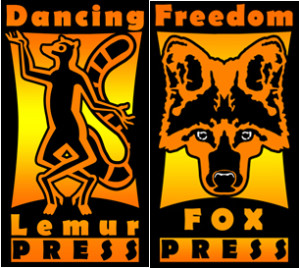by L. Diane Wolfe, @SpunkOnAStick
Writers have many options when it comes to getting stories in front of readers. If you’re seeking a traditional publisher or an agent, you’ll need to submit your manuscript for consideration. A lot of work goes into the process, so you want to do it right and not waste your time.
As the owner of Dancing Lemur Press, L.L.C. and Freedom Fox Press, I’ve seen a lot of queries over the years. What’s sad is how many I reject without ever getting to the story itself. Most of the issues could be avoided by taking a few simple steps.
1 – Learn to do a proper query letter
There are websites and books dedicated to query letter writing. Study them and practice. Understand the format and keep the query to one page. Polish your pitch and focus on the basics – who, what, where, when, and why. Learn how to write a proper synopsis (a brief encapsulation covering the key plot points) and an outline (an exhaustive summary of an entire manuscript, with a descriptive paragraph devoted to each chapter.)
2 – Research the publisher/agent
Check what genres they publish and what they are currently accepting. The submission guidelines on their website will have the most current information. Examine the books they’ve published in the past. Once you’ve made a list of potential candidates, locate them on the Preditors and Editors website. If you see red, run away.
3 – Read the submission guidelines carefully
What do they want you to send? Query letter only? A synopsis? An outline? The first three chapters? Only send what they request. Also note if they ask for a marketing plan or any other specific information. Address the proper person in the query letter. Most publishers and agents accept email queries now and you’ll want to paste your information in the body of the email, as emails with attachments are often deleted without being read.
Remember, a query letter is an editor’s first impression of a new writer. It’s the first test a writer must pass in the submission process. And there are many reasons why submissions are rejected:
- Improper formatting
- Addressed to the wrong person
- Omission of requested information.
- Poor attitude—writer comes off as cocky, overbearing, insolent, or just a jerk.
- Querying a genre they don’t accept
- Author isn’t marketable
- Synopsis doesn’t intrigue or grab the editor/reader
- A similar book is already in production
- Manuscript isn’t marketable or it doesn’t fit their current needs
- Editor was having a bad day
The first five items send one of two messages – either the writer can’t follow directions or he/she will be difficult to work with. Those will result in a rejection every time no matter how good the story. An unmarketable author might be someone with no means to promote the book or someone highly controversial. The remaining items all have to do with timing, quality of work, and sometimes back luck. Whatever response you get, address the issue and move on.
Follow those steps and avoid the pitfalls where possible. Make your submission stand out in a good way. Believe me, nothing makes me happier than receiving a proper query letter!
Diane Wolfe owns Dancing Lemur Press, L.L.C. and is the author of seven books,  including two non-fiction titles and a NA/YA series, The Circle of Friends. Known as “Spunk On A Stick,” Wolfe is a member of the National Speakers Association. She conducts seminars on book publishing, promoting, leadership, and goal-setting, and she offers book formatting and author consultation. She travels extensively for media interviews and speaking engagements, and contributes to the Insecure Writer’s Support Group website.
including two non-fiction titles and a NA/YA series, The Circle of Friends. Known as “Spunk On A Stick,” Wolfe is a member of the National Speakers Association. She conducts seminars on book publishing, promoting, leadership, and goal-setting, and she offers book formatting and author consultation. She travels extensively for media interviews and speaking engagements, and contributes to the Insecure Writer’s Support Group website.
The Insecure Writer’s Support Group
A publisher with tips for submissions and queries: Click To Tweet
Hi Elizabeth and Diane – as always a succinct and appropriately informative blog post for us on Query Letters … I’m sure you must reject many … we all need to be passionate about our own work, but also about the professionalism of the market we are part of … good luck to all submitters … cheers Hilary
Diane–Thanks so much for the post today. Professionalism is so important for writers and your list of reasons why a query might be rejected points out many ways writers might fall short of that trait. Great reminder that it’s important to research publishers and other pros and know exactly what they publish and to research the market and understand what’s out there.
Glad I didn’t come off as a jerk!
Hilary, I’d say 2 out of 3 I reject because they’ve done it wrong.
Elizabeth, thank you for the opportunity to visit today.
Alex, you’re so not a jerk!
Very informative post, Diane. It’s sad to think a person would spend so much time writing a story, but so little time on a query letter. Wishing you many wonderful submissions.
Hi, Elizabeth!
I don’t think some people spend any time on the query.
Oh, these are great pieces of advice, so thanks! I think one of the most important things to do is read everything carefully. There are almost always reasons for which publishers want you to do things in a certain way, and I think it’s important to follow the instructions. Seems simple, but it doesn’t always happen.
The directions are always so clear but so many people fail to follow them.
These are great tips about querying. There are plenty of places on the net to find examples about writing queries, and just as with a manuscript, it’s often helpful to get feedback from CPs on a query letter and a synopsis. I don’t make a move without my fabulous CPs looking things over and giving me their two-cents! :)
Lexa, that is wise – and it shows in your queries.
Thanks for the encouraging tips, Diane! Much appreciated. Elizabeth, thanks for hosting!
Great tips, Dianne. You’re right that there are so many resources out there to help a writer get the query letter right. There are so many other ways to get rejected. You don’t want to have it be for something you could control.
You sure don’t.
When I think of how “hard” the research is now to find the publisher with the best fit, I remind myself that it was harder pre-internet. I think the reason so many queries are so far off the mark is that the author is riding the high of finally finishing the book (and being happy with it). Instead of just getting it out there, we all need to settle down, breathe, and research. As you say, writing an excellent query letter will likely make the difference as to whether or not the book even is read. Good notes. I didn’t know about that Preditors and Editors website. Good stuff!
That high would explain why so many jump into querying before they know what they are doing.
Useful information. Writing a good query is never easy, but authors do have to pay attention to every detail. My advice is to send the final query to yourself and let at least one night pass before you check it for typos. Then send it to the publisher.
Writing queries is the absolutely worst part of being a writer.
Well this is timely! I’m just waiting to hear back from my mentor on a query letter. It is rather like dancing a pavane – so many ways to wrong-foot it and the clothing is so restrictive! One thing I work hard to include is a sense of my personality – after all, we aren’t just selling our manuscript but ourselves. It is a difficult trick to come across as both confident and humble, business-like but friendly – and all on one page!
Thanks Elizabeth and Diane!
It is. Most queries have either personality in the story or in the author, but rarely both. As long as the story has personality and the query is professional, I’m not as worried about the author, at least not at that stage.
Super and informative post. Thank you!
Great information, Diane. I hope it’s viewed by many.
Greetings, Elizabeth.
Very helpful information, Diane.
Hello, Elizabeth.
Thanks Diane for the tips! I’m going to start the query process for a M/G – Y/A series. Can you tell me is summer not qa good time to query? Do agents take these months off? Thanks.
Some might be on vacation, but I think only December is truly a bad time to query publishers and agents.
I think a lot of new writers don’t investigate what a publisher or agent is interested in looking at. I’ve met many who don’t have a clue about formatting.
Susan Says
Terrific tips! One’s to follow religiously!
A query letter is like a job interview — be short, be professional, and be winning. And submitting without knowing what the publisher wishes to see from authors is like insisting upon speaking Russian on a date with a French starlet — you are not going to get to first base! :-)
Very true, Roland.
Hi, Elizabeth,
Thanks for featuring L. Diane today. She always has such great advice to give to writers. Even seasoned writers can forget the basic rules. It’s always good to send out reminders from time-to-time…
You can’t do better than getting the information from someone who knows everything about the process.
Excellent tips, Diane! Doing the research proves you’re reasonably intelligent and a professional :)
I’ve read numerous queries to get mine right. These are wonderful tips.
Writing a query letter, to me, is hard because it has to be just right. Edit, edit, edit it, like the story.
Some days, I would settle for just shy of right! LOL
Hi Elizabeth and Diane~ Great tips on how to maintain a professional profile! It must be frustrating to see people not following the course of action. Thank you, Diane!
Hi Elizabeth! Hi L Diane!
You hear contradictory things about querying and submissions, but I think to give yourself the best chance you have to take these things very seriously. Thank you for the guides. I’ve bookmarked them for later.
Denise :-)
Smart and succinct advice as usual, L Diane!
Excellent tips. Writers by their very nature aren’t generally good at business letters. These tips are so valuable, Diane. Thanks for sharing.
This is great, Diane–thank you! The synopsis is the thing I have the most trouble with…
Good tips! I have to say I’m glad I’ve stopped querying for now. :-)
Great tips, Diane. I think I’ve spent almost as much time on my query as I have on my novel… almost ;)
This is great information. Query letters can be even more difficult to write than a manuscript!